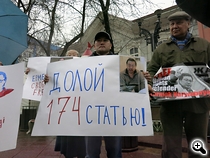
The protest took place two days before Kazakhstan votes in a snap parliamentary election, and was the first time activists had staged any such actions during a lackluster campaign for an election certain to be won by the ruling party of President Nursultan Nazarbayev.
“Freedom for Yermek Narymbayev,” chanted the five activists who took part in the picket on a pedestrian shopping thoroughfare in downtown Almaty.
They held up banners in Kazakh, English and Russian showing demands such as “Free human rights defender Yermek Narymbayev” and calling for the abolition of Article 174 of the criminal code under which he was jailed on charges of inciting ethnic strife.
The protest lasted approximately three minutes and attracted little attention on a quiet and rainy weekday morning.
With no police in the immediate vicinity to witness it, no arrests were made. Public protest is rare in Kazakhstan and protesters are frequently detained on charges of breaching stringent public assembly laws.
Narymbayev was handed a three-year jail term in January on charges of inciting ethnic enmity following a trial in which fellow activist Serikzhan Mambetalin received a two-year term.
The two were released under house arrest shortly after their sentencing pending an appeal hearing due later this month. They spent four months in jail before their release, and will return to prison to serve out their time if the appeal fails.
Human rights campaigners have expressed concern over the trial, which hinged on their Facebook postings discussing an unpublished book written two decades ago.
The trial was orchestrated as “a political case” aimed at silencing Narymbayev, protester Suyundyk Aldabergenov told EurasiaNet.org. The activist previously served nearly two years in jail for a previous offense of breaching public assembly laws in 2010 over a rally at which he shouted “Nazarbayev out!”
Supporters suspect that the authorities launched the criminal case to prevent the two defendants from engaging in civil activism ahead of local and parliamentary elections on March 20.
The two have indeed been long-term critics of Nazarbayev’s rule and are known as vocal online dissenters, but wield little on-the-ground influence to rally crowds against the government. With street-based politics almost entirely sidelined, opponents of government policy are primarily confined to cyberspace.
The Almaty protesters also called for the abolition of the crime under which Narymbayev and Mambetalin were jailed.
Human rights campaigners have previously urged the abolition of the charge of incitement to social, ethnic, tribal, racial, class or religious strife, on the grounds that it is vague and selectively applied.
Yevgeniy Zhovtis, Kazakhstan’s best-known human rights campaigner, said in January that the charge could, “given the desire, be used against inconvenient dissidents and political opponents.”
EurasiaNet.Org, 18.03.2016




